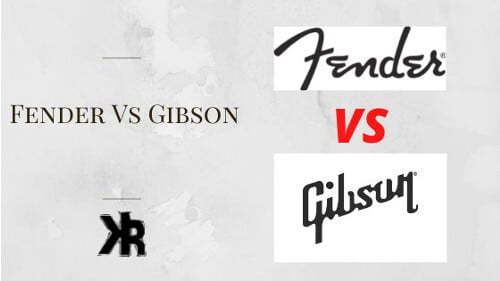Table of Contents
When it comes to the guitars that have shaped music as we know it, Fender vs Gibson has always been the debate. These are two companies that have provided guitarists with quality instruments for decades! But are very different when it comes to design and tone.
Fender has always been recognized for their Stratocaster and Telecaster guitars. These are instruments with a bright single-coil pickup sound. Gibson on the other hand has been known more for their warm humbucker tone and higher output.
Both guitar brands make great instruments and can cover many styles of music. Their high quality and craftsmanship have made them both iconic guitar brands. And for many years! Let’s explore them further and see who might fit you best.
Quick Comparison
Here are some primary differences to consider when trying to decide between these two iconic brands:
- Pickups: Fender electric guitars use mostly single-coil pickups. Gibson guitars feature mostly humbucker style pickups or similar ones such as P90s.
- Design: The design elements that immediately set the two brands apart are the body shapes, scale lengths, necks, and headstocks.
- Tone: Fender tone usually describes a bright, woody sound with a strong attack, while Gibson guitars are the choice for their warm tones. Both brands are versatile enough for blues and rock settings. However, Fenders are more commonly found in modern music, country, and funk, especially when a brighter tone with lower gain is desired.
- Style: Both Fender and Gibson have different models for different musical styles and tastes. Fender guitars are usually made with alder and ash, producing a brighter tone and offering a lighter feel. Gibson guitars are usually made with mahogany and maple, producing a warmer tone and offering a heavier feel.
Main Differences Between Fender and Gibson
There are some rather apparent differences between these two brands. Their guitars are made for specific music styles.
Aesthetics
The first and most obvious difference between these two brands is the look of their guitars. Fender has always had a more simplistic design. With less ornate appointments than Gibson.
This is mainly due to Leo Fender’s philosophy. That the focus should be on the functionality of the instrument rather than the looks.
So if you’re looking for a flashy electric guitar that will turn heads, Gibson is probably the way to go.
Body Shape
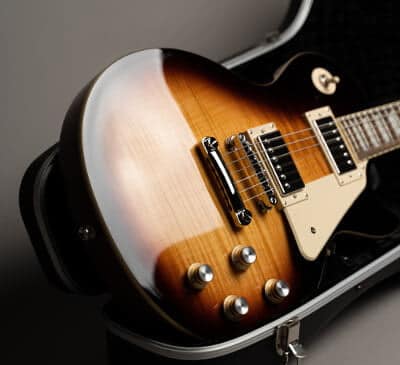
A guitar’s body shape can have a big effect on the tone and how it feels to play. Fender guitars tend to have thinner, more contoured bodies than Gibson. This gives them a lighter feel. It also makes them more comfortable playing for extended periods of time.
They are also made from light-tone woods like Ash and Alder. Which also gives them their snappy, bright sound.
Gibson, on the other hand, generally has thicker bodies. This gives the guitars a richer, fuller sound, but can make them a bit more cumbersome to play.
Guitars like the Gibson Les Paul are also known to be quite heavy as they are made with mahogany tone woods.
Each body style is also very different. The Fender guitars look very different from Gibson models. With cutaways designed onto some but not others. The Les Paul is much different looking from even the SG, which is made by the same builder.
Pickups
The type of pickups on a guitar also has a big influence on the tone. Fender typically uses single-coil pickups that give the guitar a bright, twangy sound.
There are certain models that have humbuckers. But overall, players want that single-coil Fender sound.
Gibson uses humbucker pickups in almost all of their models. Humbuckers cancel out the unwanted 60-cycle hum that can come from single-coil pickups. They also give the guitar a thick, rich, and powerful sound.
Sound
When it comes to sound, these brands differ quite a bit. Fender’s single-coil pickups are known for their bright, clean tone. This is great for styles like country and pop. Right where you want the guitar to cut through the mix without being too overbearing.
Guitars like the Stratocaster also come with a 5-way pickup switch to allow for many sounds. This can be incredibly helpful and versatile for many types of music.
Gibson’s humbucker pickups are typically darker and thicker sounding. This is perfect for genres like rock and metal where you need a little more power and sustain.
The Les Paul is also known for its ability to get a great crunchy sound when you turn up the gain.
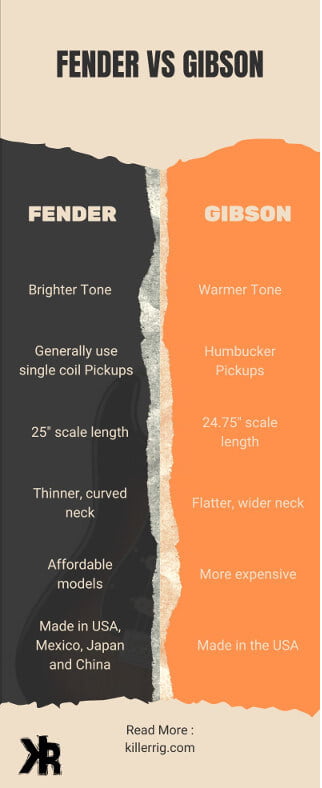
Scale Length
The scale length of a guitar is the distance from the nut to the bridge. A longer scale length means that the strings will have more tension and will be tighter when played. It also means the tone will be slightly brighter.
A shorter scale length means that the strings will have less tension and will be looser when played. This gives the guitar a different feel and a warmer tone.
Fender guitars typically have a scale length of 25.5 inches, which adds a sort of bell-like tone.
Gibson’s scale length is 24.75 inches, which contributes to a warmer, darker sound. While this difference may not seem like much, it does affect the way the guitar feels and sounds.
Fingerboard Radius
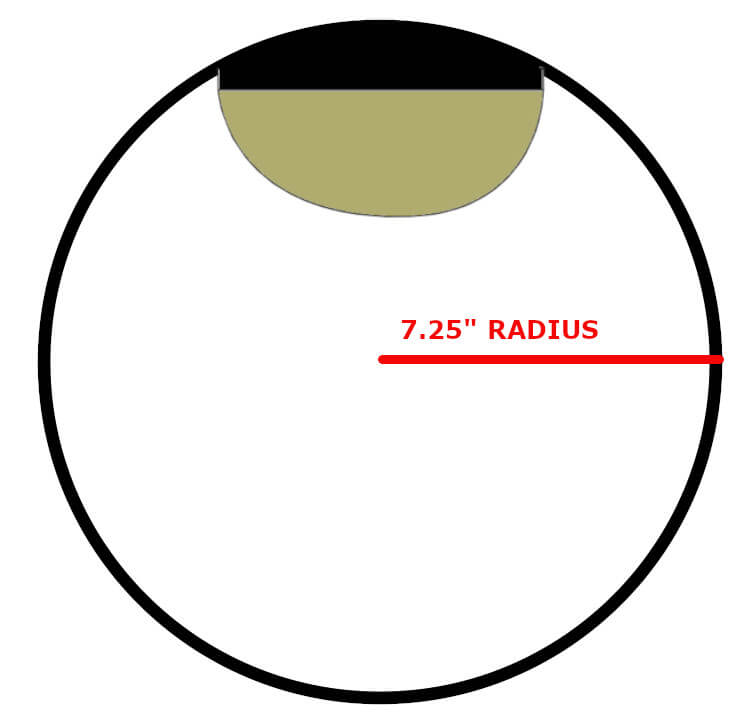
The radius of a guitar’s fingerboard is the measurement from the center of the board to the edge. A smaller radius means that the strings will be closer together. This makes it easier to play chords and bend strings.
A larger radius means that the strings will be further apart. Essentially making it more difficult to play chords but giving the player more room to solo.
Fender guitars typically have a radius of 7.25 inches, while Gibson has a radius of 12 inches. This is one of the biggest differences between the two brands.
Many players find that the larger radius of a Gibson guitar is more comfortable for soloing. It allows for more range when bending strings.
Others find that the smaller radius of a Fender guitar is better for playing chords. Ultimately, it comes down to player preference.
Build Quality
When it comes to build quality, there is a bit of disagreement. Some players feel that Fender guitars are better built and have higher-quality components.
Others find that Gibson guitars are more solid and durable. This is likely due to the fact that Gibson uses thicker, more massive bodies on their guitars. It’s also a result of where each brand makes their guitars.
Fender guitars are made in America, China, Mexico, and Japan. This depends on the model, and the price will be vastly different as well. Gibson guitars are made in Nashville, Tennessee. With some of their acoustics manufactured in their Montana Factory.
Fender has a reputation for having more consistent quality control. While Gibson has been known to have some issues with their guitars. Some of Gibson’s more affordable models have been known to suffer from more issues than Fender’s.
In recent years, however, both brands have stepped up their game! They now offer high-quality instruments that are built to last.
Check out our Fender vs Epiphone comparison here!
Price and Availability
Fender and Gibson both make high-quality instruments that are built to last. With that said, they do differ quite a bit in price.
Fender guitars are generally more affordable than their Gibson counterparts. This is due to the fact that some models are mass-produced in factories located in Asia.
Gibson guitars are handmade in America and, as a result, are more expensive. They are also less available, as they are not produced in as high of numbers as Fender guitars. This can make them difficult to find, especially if you’re looking for a specific model.
When it comes to price and availability, Fender has the upper hand. But that doesn’t mean Gibson isn’t worth the investment.

Fender Entry Level
Here are a few examples of entry level guitars that can be purchased from Fender and their cost.
| Fender Model | Price |
|---|---|
| Fender Player Stratocaster | $850.00 |
| Fender Player Telecaster | $850.00 |
| Special Edition Telecaster | $1000.00 |
| Vintera Jazzmaster | $1200.00 |
Gibson Entry Level
When it comes to Gibson entry-level guitars, there is a bit of a difference, but it’s well worth the investment.
| Gibson Model | Price |
|---|---|
| Gibson Les Paul Special | $999.00 |
| Gibson Les Paul Tribute | $1300.00 |
| SG Standard Tribute | $1300.00 |
| Les Paul Studio | $1600.00 |
Which Brand is Better for a Beginner?
Both Fender and Gibson make excellent guitars, just as you gave seen. But if you are new to playing the guitar, you might be wondering which brand is a better fit for a beginner. First, you need to consider your budget.
Fender makes guitars that are more affordable. For a new player, this is very attractive. Their line of Player series instruments are easy to get into and quickly.
Gibson on the other hand is more expensive and will require a greater investment to get started.
Then, you must consider your music style. If a Fender doesn’t get you playing the type of music you like, then a Gibson will be a better fit. This is because for a beginner, you must make sure that the guitar you choose will allow you to play your favorite songs.
But when it comes right down to it, my opinion is to look at the Fender guitars first if you are a beginner.
Which Brand Do Professionals Prefer?
When it comes to the professional scene, both Fender and Gibson have their fair share of devotees. However, the choice often boils down to the specific needs of the musician and the genre they’re involved in.
Rock and Blues
Gibson’s Les Paul and SG models are a staple in the rock and blues genres. Artists like Slash, Jimmy Page, and Angus Young have made these models legendary. The warm, rich tones and high output of Gibson guitars make them ideal for these styles.
Country and Funk
Fender’s bright, twangy tones are a hit in the country and funk scenes. The Stratocaster and Telecaster models are often the go-to choices for artists like Brad Paisley and Nile Rodgers.
Jazz and Experimental Music
For jazz musicians, the warmth of a Gibson hollow-body like the ES-335 is often preferred. On the other hand, experimental musicians might lean towards Fender for its versatility and the ease with which the guitars can be modified.
Stage Presence
If we’re talking about sheer stage presence, Gibson’s flashy designs and finishes often steal the show. However, Fender’s classic look has its own understated appeal.
The Bottom Line
There’s no clear winner here; it’s all about what fits the musician’s style, needs, and personal preferences. Professionals from various genres have their favorites, and the best choice is highly individual.
Which Guitar Brand is Right for You?
The answer to this question really depends on what you’re looking for in a guitar and the type of music you play.
While each guitar brand can sound like the other in some ways, they are pretty unique.
When to Consider A Fender Guitar
Here are some of the reasons musicians choose Fender guitars.
- They use single-coil pickups for a bright, twangy tone.
- Fender guitars are very easy to modify and customize
- They are light and comfortable
- Many versatile tone options
- The fingerboard radius makes it easy for beginners to play
- There are many affordable models
Fender guitars are chosen for their great fit within certain types of music. This includes country, blues, pop, funk, soul, and rock.
Some of the most popular Fender models include the Stratocaster, Telecaster, and Jazzmaster.
When to Consider A Gibson Guitar
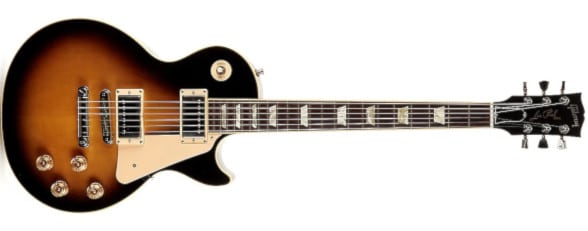
Here are some of the reasons why a player might consider Gibson guitars.
- They use humbucker pickups for a warm, full tone
- The output is larger and great for higher gain
- They are fun and easy to play
- Great tone-shaping options
- American Made
- Iconic body style and aesthetics
People who use Gibson guitars normally play rock and higher gain metal music. But the warm sound of a Gibson can also be a great fit for blues, classic, pop, and funk.
Some of the most popular Gibson models include the Les Paul, SG, Flying V, and Explorer.
Check out our Fender vs PRS comparison here!
FAQs
Who sells more guitars, Fender or Gibson?
Fender has always been the larger company, selling more guitars overall than Gibson. With their ability to manufacture overseas and lower entry-level models. Fender sells more guitars than Gibson.
Are Fender and Gibson rivals?
Fender and Gibson have always been considered rivals. This is due to their similar histories, target markets, and iconic status within the guitar world.
Are Gibson guitars handmade?
Gibson guitars are handmade in America. This makes them more expensive because of the labor costs of finishing each step and process by hand.

